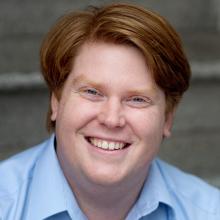John opens the show by saying that while we don’t know if there is a God, there is definitely morality in this world. Ken brings up Dostoyevsky, who says that if God is dead then everything is permitted, meaning that there is no distinction between right and wrong and that thus there is no morality. Dostoyevsky is dead, says John, and many modern philosophers don’t rely on God in their attempt to understand the essence of morality. But isn’t it much harder to establish the groundwork of morality when you give up on God, asks Ken? John then brings up a dilemma that goes back to the days of Plato: is murder wrong because God prohibits it? Or does God prohibit murder because it is wrong? Ken believes that the idea of a God gives us a chance to start understanding morality and that a secular world has no chance to explain absolute morality. John asks why he should care about such a creator of the universe if what he has created is quite a mess; the duo debate.
John and Ken welcome guest John Figdor, Humanist chaplain at Stanford University and co-author of Atheist Mind, Humanist Heart: Rewriting the Ten Commandments for the Twenty-First Century. Figdor is first asked what it is exactly a humanist chaplain does; he explains that his responsibilities consist of providing counseling for students on campus and advocating for a non-religious perspective, hosting large public events to educate the Stanford campus about atheism and non-religious belief, and hosting service projects like blood drives, park cleanups, and other charitable events. Ken asks Figdor why the humanist chaplain is included as a member of the Office of Religious Life? Figdor explains that religious programs should also include resources for students who have a different perspective or belief. John asks what one should think in the case of there being no God and thus no absolute morality. Figdor agrees that there is no such thing as absolute, objective morality; morality can only be subjective. This being said, not all opinions regarding the morality of acts are equally good. So is god the only possible source of morality, Ken asks? Figdor does not believe so.
How do we determine what is wrong? Can things just be wrong, a gut feeling, or is there a stronger basis for what we determine is morally acceptable? An example provided is the case of torturing children – isn’t there something objectively wrong about mistreating a child, regardless of circumstances? Figdor replies that such a situation is wrong, but not inherently, objectively binding; human opinions vary and must be taken into account in a discussion of objectivity. Ken expresses concern – is Figdor giving up the thought that it is objectively required for one to respect the child in question? John chimes in – perhaps there is no objective right view, but there are many wrong views. John and Ken welcome audience participation, and the challenge of basing morality solely on secular roots, whether one needs God to live a moral life, and the question of whether there is an author to the laws of morality are further discussed.
- Roving Philosophical Report (Seek to 7:45): Shuka Kalantari refers to the statement made by the chancellor of Troy University – that atheism leads to moral decay. Shuka speaks with Rick Henderson, an evangelical Christian pastor from Utah, about whether people can have a subjective moral standard. Rick explains that there is no objective moral truth and no value difference between the opinions of people, as a number of philosophers and authors the likes of Kierkegaard, Sartre, C.S. Lewis, and Camus, have argued.
- 60-Second Philosopher (Seek to 46:30): Ian Shoales speeds through the current culture wars, touching on American Sniper, the Twitter shaming epidemic in light of the Bill Cosby rape allegations, and what good social media does in general.



